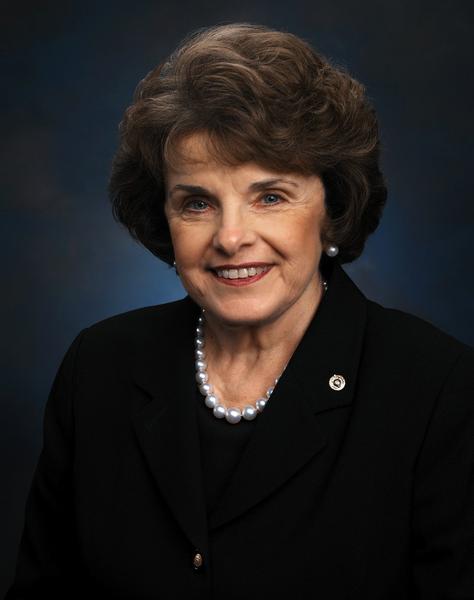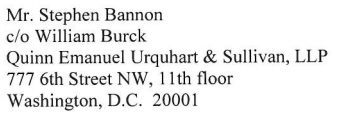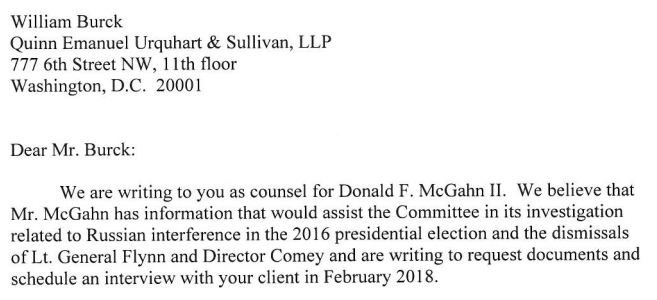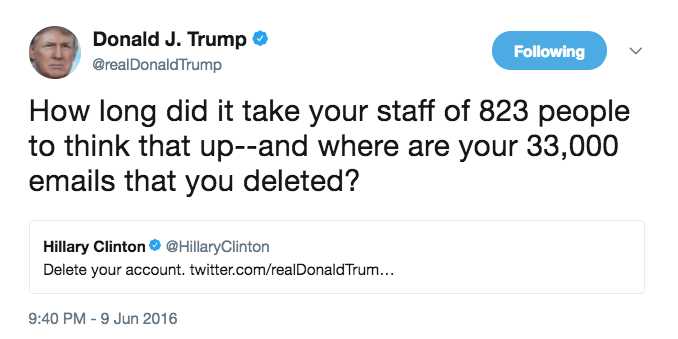I did two podcasts this week where I elaborated on my theory that the current story we have about the June 9, 2016 Trump Tower meeting is just a limited hangout, a partial story that I suspect serves to hide a later, more damning part of the meeting:
I first started suspecting that the current story — that Natalia Veselnitskaya pitched a request for Magnitsky sanctions relief in exchange for … almost no dirt on Hillary — was a limited hangout as I tracked Scott Balber’s repeated heavy-handed attempts to craft a story that could explain the known emails and documents.
I want to lay out my evolving, more developed theory here.
For weeks, Russians had been offering emails in exchange for meetings
The Trump campaign first learned about “dirt” on Hillary in the form of thousands of emails on April 26. The day after learning of those emails, George Papadopoulos sent two emails to Trump campaign staffers, that may have reflected a discussion of an early quid pro quo: some meetings — meant to lead to one between Trump and Putin — in exchange for emails.
To Stephen Miller, Papadopoulos wrote, “Have some interesting messages coming in from Moscow about a trip when the time is right.” To Corey Lewandowski, it appears he asked for a phone call “to discuss Russia’s interest in hosting Mr. Trump. Have been receiving a lot of calls over the last month about Putin wanting to host him and the team when the time is right.”
That same day, he sent his Russian handler, Ivan Timofeev, an email saying that the first major Trump foreign policy speech he helped author was a “signal to meet.” The speech spoke, in part, about making a great deal with Russia.
I believe an easing of tensions, and improved relations with Russia from a position of strength only is possible, absolutely possible. Common sense says this cycle, this horrible cycle of hostility must end and ideally will end soon. Good for both countries.
Some say the Russians won’t be reasonable. I intend to find out. If we can’t make a deal under my administration, a deal that’s great — not good, great — for America, but also good for Russia, then we will quickly walk from the table. It’s as simple as that. We’re going to find out.
Over the course of the next month, Papadopoulos sent a Timofeev invitation for a meeting to move towards setting up a Putin-Trump meeting via email to Lewandowski (on May 4), to Sam Clovis (on May 5, after which they spoke by phone), and to Paul Manafort (on May 21), with additional back and forth in between.
Who is the Crown Prosecutor?
Around that time in late May, Natalia Veselnitskaya met with long-time Trump associate Aras Agalarov and mentioned her efforts to help Denis Katsyv in his legal fight with Bill Browder (note, elsewhere Veselnitskaya claimed she normally keeps her clients’ business compartmented, but claims not to have done so in this case) and to lobby against the Magnitsky sanctions. That’s where, according to Veselnitskaya, the idea of connecting her with Don Jr first came about, though she doesn’t remember who came up with the idea.
Around the end of May 2016, during a conversation with a good acquaintance of mine, being my client, Aras Agalarov on a topic that was not related to the United States, I shared the story faced when defending another client, Denis Katsyv, about how terribly misled the US Congress had been by the tax defrauder William Browder, convicted in Russia, who, through his lobbyists and his close-minded rank-and-file Congress staffers, succeeded in adopting the Act in the name of a person whom Browder practically hardly ever knew.
I considered it my duty to inform the Congress people about it and asked Mr. Agalarov if there was any possibility of helping me or my colleagues to do this. I do not remember who of us was struck by the idea that maybe his son could talk about this with Donald Trump, Jr., who, although a businessman, was sure to have some acquaintances among Congress people. After my conversation with Mr. Agalarov, I prepared a reference in case it would be necessary to hand over the request – to support the hearings in the Subcommittee in the US House Committee on Foreign Affairs as to the Magnitsky’s and Browder’s story, scheduled for mid-June.
The timing of this meeting is important. We know that the date on the document alleged to be the “dirt” handed to Don Jr — one that she claims she prepared “in case it would be necessary to hand over” is May 31. Either this meeting happened before May 31 (which is when Veselnitskaya described it to have taken place), or the document was instead drawn up exclusively for lobbying purposes (which would be unsurprising, but would be inconsistent with the testimony that uses the talking points to prove the meeting was only about Magnitsky sanctions). Elsewhere she gets sketchy about the date of the document, and produced as it was by Agalarov lawyer Scott Balber, we can’t be sure about the forensics of the document.
The reason the date is important, however, is that, in pitching the Trump Tower meeting on June 3, Rob Goldstone told Don Jr that Emin Agalarov’s father met with “the Crown Prosecutor” that morning.
Emin just called and asked me to contact you with something very interesting.
The Crown prosecutor of Russia met with his father Aras this morning and in their meeting offered to provide the Trump campaign with some official documents and information that would incriminate Hillary and her dealings with Russia and would be very useful to your father.
This is obviously very high level and sensitive information but is part of Russia and its government’s support for Mr. Trump – helped along by Aras and Emin. [my emphasis]
Admittedly, any discrepancy on dates might be due to the game of telephone going on — Aras to Emin to Goldstone. But if the meeting in question really did happen on June 3, then it significantly increases the likelihood that “Crown Prosecutor” is not at all a reference to Veselnitskaya (who claims to have met with Agalarov earlier), as has been claimed, but is to someone else, dealing a different kind of dirt.
Spoiler alert: I suspect it is not a reference to her.
In his version of this story, Goldstone says he only played this broker role reluctantly.
“I remember specifically saying to Emin, you know, we probably shouldn’t get involved in this. It’s politics, it’s Hillary Clinton and Donald Trump. Neither of us have any experience in this world. It’s not our forte. I deal with music. You’re a singer and a businessman.”
Don Jr seems to have shown no such reluctance. He emailed back 17 minutes later saying, “if it’s what you say I love it especially later in the summer.” He says that, in spite of the claim he made in his testimony that, “I had no additional information to validate what Rob was saying, I did not quite know what to make of his email.” Whatever Don Jr expected it to include on June 3, he may have gotten a clearer sense of what it was on June 6, when he spoke to Emin in a phone call set up in about an hour’s time, just as Emin got off the stage.
In fact, Don Jr had three “very short” phone calls in this period, but he’s getting forgetful in his old age and so doesn’t remember what transpired on them.
My phone records show three very short phone calls between Emin and me between June 6th and 7th. I do not recall speaking to Emin. It is possible that we left each other voice mail messages. I simply do not remember.
Veselnitskaya did not get her visa to come to the US until June 6. That’s the day when Goldstone, referencing Don Jr’s earlier instructions on timing, followed-up about a meeting.
Let me know when you are free to talk with Emin by phone about this Hillary info.
Ike Kaveladze’s still unexplained late inclusion in the meeting
Goldstone was still finalizing the meeting time on June 8 at 10:34 AM. But sometime, presumably after the time on June 7 at 6:14PM, when Don Jr told Goldstone that Paul Manafort and Jared Kushner would also attend, fellow Agalarov employee Ike Kaveladze got invited, though without Veselnitskaya ever learning why. At some unidentified time, Kaveladze called an associate of Goldstone’s and learned that the meeting would be about discussing “dirt” on Hillary Clinton — the same word Papadopoulos’ handlers had used.
Scott Balber, Kaveladze’s attorney, told The Daily Beast that before Kaveladze headed from Los Angeles to New York for the meeting, he saw an email noting that Kushner, Manafort, and Trump Jr. would all be involved. He thought it would be odd for them to attend the meeting, so he called Beniaminov before heading to New York. Both Beniaminov and Kaveladze have worked with the Agalarov’s real estate development company, the Crocus Group.
Balber said that Beniaminov told Kaveladze that he heard Rob Goldstone— Emin Agalarov’s music manager—discuss “dirt” on Hillary Clinton. It’s never become completely clear what kind of “dirt” the Russians were talking about.
Having learned of a meeting dealing dirt that included Don Jr, Kushner, and Manafort, Kaveladze got on a plane and flew to NYC.
According to Veselnitskaya’s very sketchy account, she got an email finalizing the meeting when she arrived in NYC on June 8 — an email that was also CC’ed to Kaveladze. She and Kaveladze spoke by phone sometime that day, and met sometime before the meeting.
With those present at the meeting, Samochernov, Kaveladze, and Akhmetshin, I spoke about the meeting on the day it was to be held, possibly, I mentioned it the day I arrived in New York when speaking with Kaveladze by phone, but I do not have exact information about it.
[snip]
We got acquainted first by phone when I was in Moscow. I met him personally first on June 9 shortly before the meeting.
[snip]
We had a phone call and met at a café, I do not remember where and at what café. I told him briefly what I knew about the Browder case, about the Ziffs and their possible support when lobbying his interests in the United States.
Like Don Jr’s memory of his phone calls with Emin, Veselnitskaya claims to have forgotten what got said in that phone call with Kaveladze.
Competing versions of the meeting
Which brings us to June 9.
We don’t know what Kaveladze’s schedule was. We do know that on the morning of June 9 — before lunch, which is when Veselnitskaya said Akhmetshin first got involved — Veselnitskaya asked Goldstone if she could bring Akhmetshin, whom she claimed had just “arrived that day in New York for an evening performance of Russian theatre stars.” Goldstone responded a half hour later, “Please bring them with you and meet Ike for your meeting at 4PM today.” (The copy of the email publicly released does not include the CC to Kaveladze that Veselnitskaya said was included.)
As I laid out in this post, Veselnitskaya says she arrived at the meeting with her translator, Kaveladze, and Akhmetshin, was met by Goldstone there, and brought to a board room where Don Jr and Manafort were already present.
I came to the meeting with Anatoly Samochornov, a translator, Irakly Kaveladze, a lawyer of my client who helped to arrange for the meeting, Rinat Akhmetshin, my colleague who was working with me on the Prevezon case. We were met by a big, stout man who introduced himself as Rob and escorted us on the elevator to the boardroom. I saw two men in the boardroom – one of them introduced himself as Donald Trump Jr., while the other did not introduce himself. Another young man entered the boardroom a little later and left it shortly afterwards. I found out much later that the two unidentified gentlemen were P. Manafort and J. Kushner.
According to Veselnitskaya, Kaveladze was introduced — to the extent he was — as “Ike.” Remember that he attended the 2013 dinner celebrating the Agalarov-brokered deal to bring Miss Universe to Moscow, meaning at least some in the Trump camp should know him.
Veselnitskaya’s account seems to line up with Jared Kushner’s, which basically has him arriving late, staying for about 10 minutes of Veselnitskaya’s discussion of adoptions (though he seems to be claiming not to be present for any discussion of Magnitsky sanctions), then asked his assistant to give him an excuse to leave.
I arrived at the meeting a little late. When I got there, the person who has since been identified as a Russian attorney was talking about the issue of a ban on U.S. adoptions of Russian children. I had no idea why that topic was being raised and quickly determined that my time was not well-spent at this meeting. Reviewing emails recently confirmed my memory that the meeting was a waste of our time and that, in looking for a polite way to leave and get back to my work, I actually emailed an assistant from the meeting after I had been there for ten or so minutes and wrote “Can u pls call me on my cell? Need excuse to get out of meeting.” I had not met the attorney before the meeting nor spoken with her since. I thought nothing more of this short meeting until it came to my attention recently. I did not read or recall this email exchange before it was shown to me by my lawyers when reviewing documents for submission to the committees. No part of the meeting I attended included anything about the campaign, there was no follow up to the meeting that I am aware of, I do not recall how many people were there (or their names), and I have no knowledge of any documents being offered or accepted.
Jared claims not to know who was at the meeting, which is somewhat credible given that he arrived after introductions.
For some reason, Goldstone holds out the claim this meeting started by talking about Democratic campaign donations then moved to sanctions.
Goldstone tells me that he only half-listened to the presentation from Natalia Veselnitskaya, the Russian lawyer, as he checked emails on his phone. But he insists, as Trump Jr has done, that the meeting ended awkwardly after she switched tack from discussing Democratic funding to US sanctions legislation and Moscow’s retaliatory policy that restricts Americans from adopting Russian children. “It was vague, generic nonsense,” Goldstone says.
[snip]
“Within minutes of starting, Jared said to her, ‘Could you just get to the point? I’m not sure I’m following what you’re saying,’ ” Goldstone says.
It was then that she started talking in detail about the provisions of the Magnitsky legislation and adoptions, he says. “I believe that she practised a classic bait-and-switch. She got in there on one pretext and really wanted to discuss something else.”
Don Jr’s memory of the meeting is somewhat different. Not only doesn’t he remember Akhmetshin’s presence at all, but he remembers Manafort arriving after the visitors were already in the conference room (mind you, I don’t consider this a significant discrepancy). And he definitely remembers adoptions being discussed at the same time as the sanctions.
As I recall, at or around 4 pm, Rob Goldstone came up to our offices and entered our conference room with a lawyer who I now know to be Natalia Veselnitskaya. Joining them was a translator and a man who was introduced to me as Irakli Kaveladze. After a few minutes, Jared and Paul joined. While numerous press outlets have reported that there were a total of eight people present at the meeting, I only recall seven. Because Rob was able to bring the entire group up by only giving his name to the security guard in the lobby, I had no advance warning regarding who or how many people would be attending. There is no attendance log to refer back to and I did not take notes.
After perfunctory greetings, the lawyer began telling the group very generally something about individuals connected to Russia supporting or funding Democratic Presidential Candidate Hillary Clinton or the Democratic National Committee. It was quite difficult for me to understand what she was saying or why. Given our busy schedules, we politely asked if she could be more specific and provide more clarity about her objective for the meeting. At that point, Ms. Veselnitskaya pivoted and began talking about the adoption of Russian children by U.S. citizens and something called the Magnitsky Act.
Until that day, I had never heard of the Magnitsky Act and had no familiarity with this issue. It was clear to me that her real purpose in asking for the meeting all along was to discuss Russian adoptions and the Magnitsky Act. At this point, Jared excused himself from the meeting to take a phone call.
Despite some minor differences in choreography, thus far the differences in the stories are not that substantial.
That changes, though, in the descriptions of how the meeting ended.
Don Jr claims he said that Trump was a private citizen so could do nothing to help.
I proceeded to quickly and politely end the meeting by telling Ms. Veselnitskaya that because my father was a private citizen there did not seem to be any point to having this discussion.
Goldstone claims something similar — that Don Jr told Veselnitskaya she should talk to Obama’s Administration, not the future Trump one.
“Don Jr ended it by telling her that she should be addressing her concerns to the Obama administration, because they were the ones in power.”
But in an an interview with Bloomberg that Veselnitskaya disavowed in her statement to SJC, she said that Don Jr suggested he would reconsider the sanctions “if we came to power.”
“Looking ahead, if we come to power, we can return to this issue and think what to do about it,’’ Trump Jr. said of the 2012 law, she recalled. “I understand our side may have messed up, but it’ll take a long time to get to the bottom of it,” he added, according to her.
The extra details in the contemporaneous record as interpreted by Glenn Simpson
As far as we know, there’s only one contemporaneous record of this meeting: the notes that Manafort — whom Veselnitskaya claimed “closed his eyes and fell asleep” during the 20 minute meeting — took on his phone. Glenn Simpson was asked to comment on Manafort’s notes in his Senate testimony. Some of what he describes confirms these public accounts: the early reference to Browder, the other reference to Juliana Glover, the reference to adoptions.
MR. DAVIS: These are the meeting notes from 3 the June 9th meeting at Trump Tower. These are Mr. Manafort’s notes or they’re contemporaneous.
BY THE WITNESS:
A. I could tell — obviously you know who Bill Browder is. Cyprus Offshore, Bill Browder’s structure, you know, investment — Hermitage Capital, his hedge fund, set up numerous companies in Cyprus to engage in inward investment into Russia, which is a common structure, both partially for tax reasons but also to have entities outside of Russia, you know, managing specific investments. I can only tell you I assume that’s what that references. I don’t know what the 133 million —
[snip]
A. I can skip down a couple. So “Value in Cyprus as inter,” I don’t know what that means. “Illici,” I don’t know what that means. “Active sponsors of RNC,” I don’t know what that means. “Browder hired Joanna Glover” is a mistaken reference to Juliana Glover, who was Dick Cheney’s press secretary during the Iraq war and associated with another foreign policy controversy. “Russian adoptions by American families” I assume is a reference to the adoption issue.
While Simpson doesn’t recognize the reference, in addition to the passing reference to Cyprus shell companies, the notes allegedly used for the meeting explain the 133 million reference.
In the period of late 1999 to 2004, two companies – Speedwagon Investments 1 and 2, registered in New York, and owned by the said U.S. investors, acting through three Cypriot companies, Giggs Enterprises Limited, Zhoda Limited, Peninsular Heights Limited illegally acquired more than 133 million Gazprom shares in the amount exceeding $80 million in the name of the Russian companies Kameya, Lor, Excalibur, Sterling Investments.
But there seems to be more extensive reference to Cyprus (the laundering of money through which, of course, Manafort is himself an expert; it features centrally in his indictment).
And none of the accounts of the meeting seem to explain Manafort’s half-written “illicit,” nor does “Active sponsors of RNC” appear anywhere.
So there appear to be two things in Manafort’s notes that aren’t explained by the several accounts of the meeting: RNC support (elsewhere attributed to the reference to Ziff brothers’ political donations, something which Manafort might independently know) and, most intriguingly, “illicit” (as well, as perhaps, the more central focus on Cyprus than reflected in the talking points).
Who left the conference room when?
This brings me to the question of who left the conference room when.
According to the LAT, Mueller’s team seems newly interested in an exchange between Ivanka, Veselnitskaya, and Akhmetshin, which attests to Ivanka’s awareness — whatever her spouse’s and brother’s ignorance — of Akhmetshin’s presence.
Investigators also are exploring the involvement of the president’s daughter, Ivanka Trump, who did not attend the half-hour sit-down on June 9, 2016, but briefly spoke with two of the participants, a Russian lawyer and a Russian-born Washington lobbyist. Details of the encounter were not previously known.
It occurred at the Trump Tower elevator as the Russian lawyer, Natalia Veselnitskaya, and the lobbyist, Rinat Akhmetshin, were leaving the building and consisted of pleasantries, a person familiar with the episode said. But Mueller’s investigators want to know every contact the two visitors had with Trump’s family members and inner circle.
But it also may suggest that, after arriving with the two Russians, Ike Kaveladze may have stayed on for a bit afterwards.
Which may be backed by another detail in the various accounts of the meeting. Both Don Jr …
She thanked us for our time and everyone left the conference room. As we walked out, I recall Rob coming over to me to apologize.
And Goldstone claim that the music promoter apologized for the meeting at the end.
As he emerged from the meeting, Goldstone says that he told Trump Jr he was “deeply embarrassed” that it had been an apparent waste of time.
If Goldstone “apologized” for the meeting, as he and Don Jr claim, it suggests Goldstone, at least, stayed behind long enough to say something that would otherwise be rude to say in front of Veselnitskaya. Don Jr’s claim of an apology might provide convenient excuse.
Perhaps most curious among the first-hand accounts is Goldstone’s claim that he thought the 20-30 minute meeting was “dragging on.”
He had not even planned to attend, but was encouraged to stay by Trump Jr. His biggest concern, he says, was that if the meeting dragged on, he would be caught in the notorious Lincoln Tunnel traffic on his journey home.
But her emails
At 4:40 PM, 40 minutes after the meeting started, Trump tweeted what would become one of the most famous exchanges of the campaign, his retort to Hillary Clinton’s taunt that he should delete his Twitter account with this response,
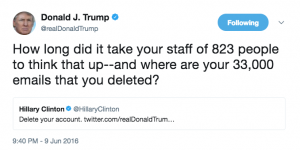
Did you say “dirt” in the form of Hillary emails?
Six days after that meeting, Guccifer 2.0 released the first of the documents stolen by hacking Democratic targets (though note, none of these are known to have come from the DNC, which is the only hack the WaPo reported on the day before; while some have been traced to Podesta’s emails, the others remain unaccounted for).
While I have argued that the specific content in that dump can be explained, in significant part, as an effort to respond to and rebut the claims CrowdStrike and the Democrats made to the WaPo, some of the documents would be particularly valuable in selling the Trump team on the value of any “dirt” on offer. That includes the oppo research on Trump himself (though that was definitely also a response to the WaPo), but also what purports to be a secret policy document stolen from Hillary’s Secretary of State computer, and a document on Hillary’s election plans. Significantly, all three of these documents were among the ones with the altered metadata, in part bearing the signature of Felix Edmundovich Dzerzhinsky.
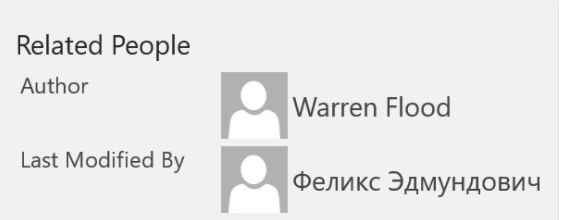
In short, that first post from Guccifer 2.0 would not only refute the confident claims the Democrats made to the WaPo, but it would provide the Trump camp with a sense of the scope of documents on offer. Within that first week, Guccifer 2.0 would even offer what claimed to be a (heh) “dossier” on Hillary Clinton. (Given my concerns that Russians learned of the Steele dossier and filled it with disinformation, I find it rather interesting that Guccifer 2.0 first advertised this dossier on the same day, June 20, that Steele submitted the first report in his dossier.)
Eerie
If, in fact, there was a second part of this meeting, it seems to be the high level meeting that George Papadopoulos had been working on setting up for weeks, meetings discussed in the context of offering dirt in the form of emails. The Russians laid out a quo — relief of the Magnitsky sanctions — and a week later, provided the first installments of the quid — oppo research from Hillary Clinton.
That would more readily explain why, on June 14, Goldstone would forward this account of the DNC hack to Emin and Ike (but not the other attendees) declaring the DNC hack to be eerie in the wake of what transpired at the meeting.
In one email dated June 14, 2016, Goldstone forwarded a CNN story on Russia’s hacking of DNC emails to his client, Russian pop star Emin Agalarov, and Ike Kaveladze, a Russian who attended the meeting along with Trump Jr., Trump’s son-in-law Jared Kushner and Manafort, describing the news as “eerily weird” given what they had discussed at Trump Tower five days earlier.
And that, I suspect, is the real story that Scott Balber has been working so hard to obscure.




